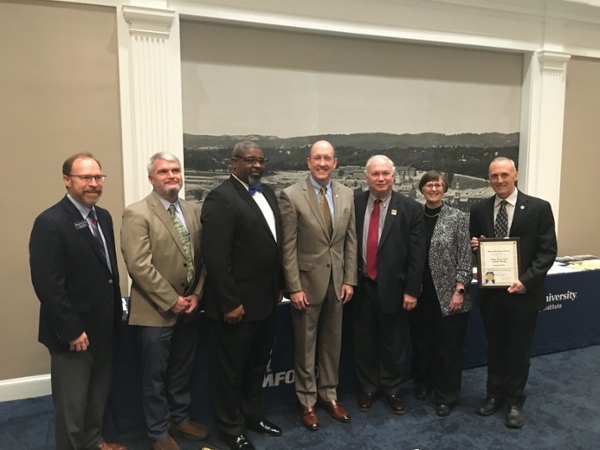
On Dec. 8, Samford University’s Ministry Training Institute(MTI) hosted a banquet to celebrate its 75th anniversary.
Guests included Samford President Beck. A. Taylor, Samford Provost Michael Hardin, Lonette Berg with the Alabama Baptist Historical Commission, Ministry Training Institute leadership and partners.
A special tribute to MTI founder Gilbert L. Guffin was given by Scott Guffin (his grandson and current executive director of the Department of Christian Ministry at Samford). Both Taylor and Hardin spoke, as did Michael Barron, MTI student and co-director of the Bessemer Extension Center. Current MTI director Kevin Blackwell gave a history of the program, and Stanford E. Angion, president of Selma University, provided the benediction.
“The Samford Extension Division is worthy of being remembered, continued and perpetually celebrated as a divinely inspired education program,” Blackwell said. “Names associated with this program read like an Alabama Baptist Hall of Fame: Gilbert Guffin, A.H. Reid, James Chapman, Major Harwell G Davis, Davis Wooley, Hampton Hopkins, Leslie Wright, Benton Towry, Lee Gallman, George Jackson, Arthur Walker, Hudson Baggett, Mabry Lunceford, Billy Adams and Timothy George.”
In May 1942, Gilbert L. Guffin, a minister in Jasper, Alabama, met with Carl Jesse, president of Walker College, about the possibility of Walker hosting a Baptist seminar. The possibility became a reality on Sept. 19, 1942, with 19 part-time pastors in attendance.
Of those first students, Guffin said, “Those were the hungriest men for knowledge I ever saw.”
The seminar was an instant success, and it soon grew to more than 100 students. Eventually, a second night was added to the class, and then graduation ceremonies. One of the first graduation keynote speakers was Maj. Harwell G. Davis, president of Howard College, which would later become Samford University. It was after this event that Davis began to consider instituting a similar program at Howard.
In 1946, Davis worked with others to create a state-wide school, similar to the seminar Guffin had started at Walker College. On April 8, 1946, a proposal was submitted to Howard’s administration and faculty and received approval. On Jan. 1, 1947, the new program was launched under Guffin’s leadership and called the Howard College Extension Division of Christian Training.
The initial years of the extension program saw exponential growth. By the fall of 1947, Guffin had already established 21 centers across the state, and by 1952, the program doubled to 44 centers. Soon, the Howard Extension Program attracted widespread attention, and the idea of extension education was eventually adopted by many Baptist schools, including Selma University, Mercer University, the University of Richmond, Gardner-Webb College, Ouachita College, Georgetown College, Louisiana College and Hardin-Simmons University.
The Seminary Extension of the Southern Baptist Convention also credits Howard College for its inception, Blackwell noted, adding, “To this very day, the model for academic extension work among Baptist colleges and universities is called ‘The Howard Plan.’”
Throughout the decades, the program has been lauded for its flexible curriculum, affordable tuition, classroom accessibility, quality instruction through gifted faculty and committed extension center directors.
Over the past 10 years, it has grown to 16 centers in Alabama to over 40 centers in three states. Enrollment has increased from 750 in 2013-14 to an expected enrollment of 2,000 in 2022-23.
Fall 2022 semester had 1,098 enrollments through the extension network, 60 through the online certificate programs and an additional 50-plus in two prison locations. A new location is coming on board next year at the Madison Baptist Association in Huntsville, as well as potential locations in Fairbanks, Alaska, and Ching Mai, Thailand.
“The future of the Ministry Training Institute will not only involve continued expansion within our state and our nation, but also in the uttermost parts of the world,” Blackwell said.
Taylor credited the current success of the program to Blackwell, who will enter his 10th year in January 2023 as the director.
“MTI is one of the best examples of Samford’s commitment to the church,” Taylor said.
“The reality is that our program is just as needed today as it was in 1947,” Blackwell said. “In 2022, the church in America is facing a crushing leadership crisis as we look toward the next decade. Pastors are retiring at an alarming rate, while seminaries are graduating less students. There has never been a more urgent need to call out the called and offer them affordable and accessible education opportunities. The extension division was born out of the needs of the people, and its purpose remains intact.”
Davis wrote in June 1947, “The establishment of the Extension Department of Christian Education by Howard College was another expression of its purpose as an educational institution to make the greatest possible contribution to forwarding the cause of Christianity. It is our hope and desire to widen constantly this service to those who have so eagerly taken advantage of it.”
According to Blackwell, the first ever promotional pamphlet ended with these words, “A rare privilege now knocks at your door. Will you heed the knock and open the doors?”
Blackwell believes the Ministry Training Institute “still offers a rare privilege,” and he plans to keep knocking on a few more doors.
